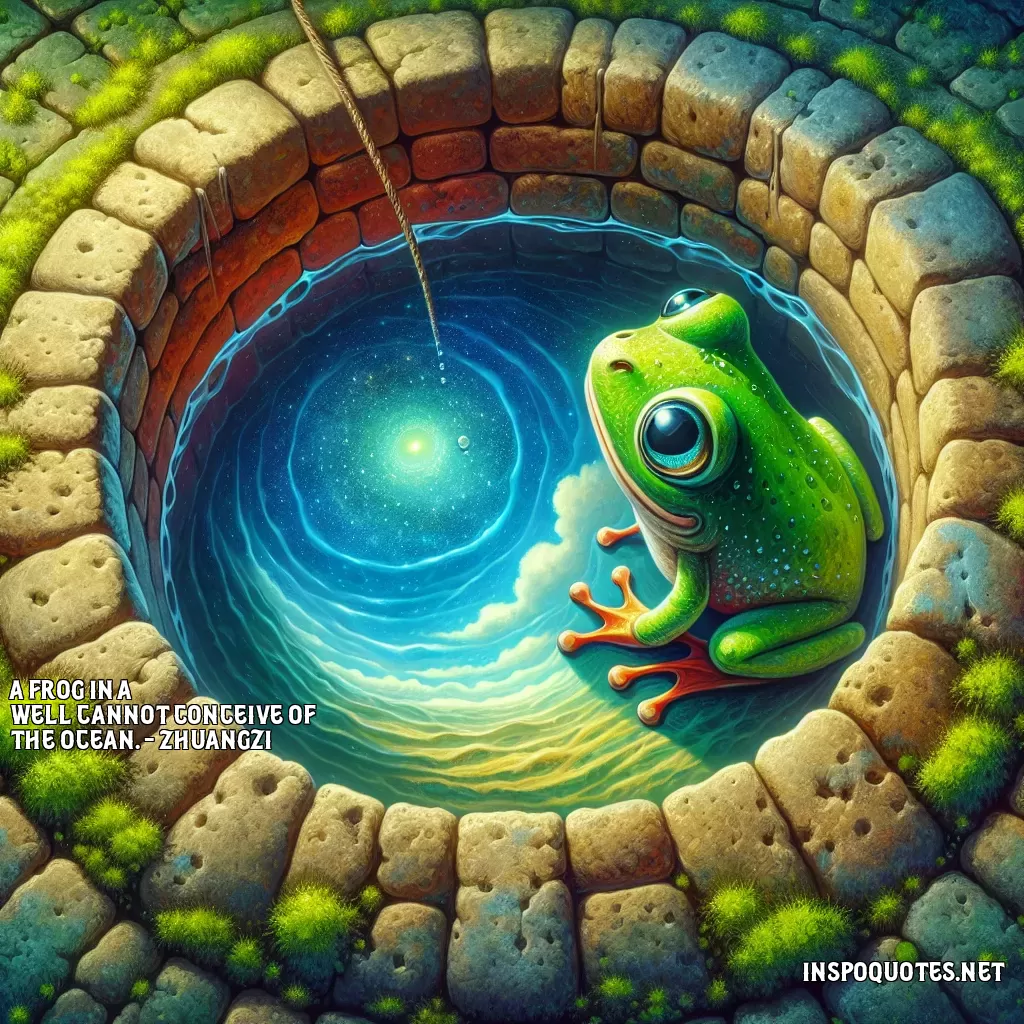
A frog in a well cannot conceive of the ocean. - Zhuangzi
Author: Zhuangzi
👁️ 12 views
The quote "A frog in a well cannot conceive of the ocean" by Zhuangzi is a metaphor that illustrates the limitations of perspective and understanding due to one’s environment or experiences. The frog, living at the bottom of a well, has a very restricted view of the world. It only knows the confines of its well and the tiny circle of sky above it. This limited perspective shapes its understanding of reality. If you were to tell the frog about the vastness of the ocean, it would be beyond the frog's comprehension because its experience is so restricted. Applying this metaphor to human life, it suggests that our understanding is often confined by the limitations of our experiences, beliefs, or immediate environment. Often, we may find it difficult to appreciate or even acknowledge ideas, possibilities, or worlds that lie outside our own limited experience, much like the frog is unable to grasp the concept of an ocean. Zhuangzi’s metaphor encourages us to step outside our metaphorical wells and expand our horizons. By broadening our experiences and embracing diverse perspectives, we can better understand the broader world and not just the small part of it we initially see. This requires humility and openness to being challenged, as well as the courage to venture into unknown territories beyond our immediate scope of experience. In doing so, much like a frog that might one day leap out and discover the expanse beyond the well, we expand our capacity for empathy, innovation, and understanding.
Quote By: Zhuangzi
Zhuangzi, whose name means "Master Zhuang," was a profound Chinese philosopher who lived around the 4th century BCE during the Warring States period. He is best known for his contributions to Daoism, a philosophical and spiritual tradition that emphasizes living in harmony with the Dao, or the Way. Zhuangzi's ideas profoundly influenced not just Daoism but also Buddhism and Confucianism, earning him a revered place in Chinese intellectual history.
Zhuangzi is celebrated for his literary style, which is characterized by a blend of philosophy, allegory, and whimsical tales. His primary work, the "Zhuangzi" (also known as "Chuang Tzu"), is a collection of anecdotes, parables, and philosophical musings that explore themes such as the relativity of human concepts, the importance of spontaneity, and the limitations of language. Through stories such as that of the butterfly dream, where Zhuangzi questions the nature of reality and identity, he encourages readers to embrace the fluidity of existence and the interconnectedness of all things.
In his writings, Zhuangzi employs humor and irony to challenge rigid thinking and societal conventions, often critiquing the Confucian emphasis on rules and propriety. He suggests that true wisdom lies in understanding the Dao and allowing life to unfold naturally, rather than striving for control or rigid moral structures. This perspective not only emphasizes personal freedom but also resonates with the themes of harmony and balance inherent in Daoist thought.
Zhuangzi's influence extends beyond philosophy; his works have inspired countless artists, poets, and writers throughout Chinese history and beyond. His ideas on spontaneity and naturalness have found resonance in various fields, from art to psychology. By encouraging a perspective grounded in humility and openness, Zhuangzi remains a pivotal figure in the development of Eastern thought.
In summary, Zhuangzi's contributions to philosophy and literature make him a foundational figure in Chinese culture. His insights continue to inspire individuals seeking a deeper understanding of life, existence, and the universe's complexities, making Zhuangzi a timeless source of wisdom.